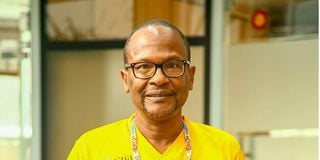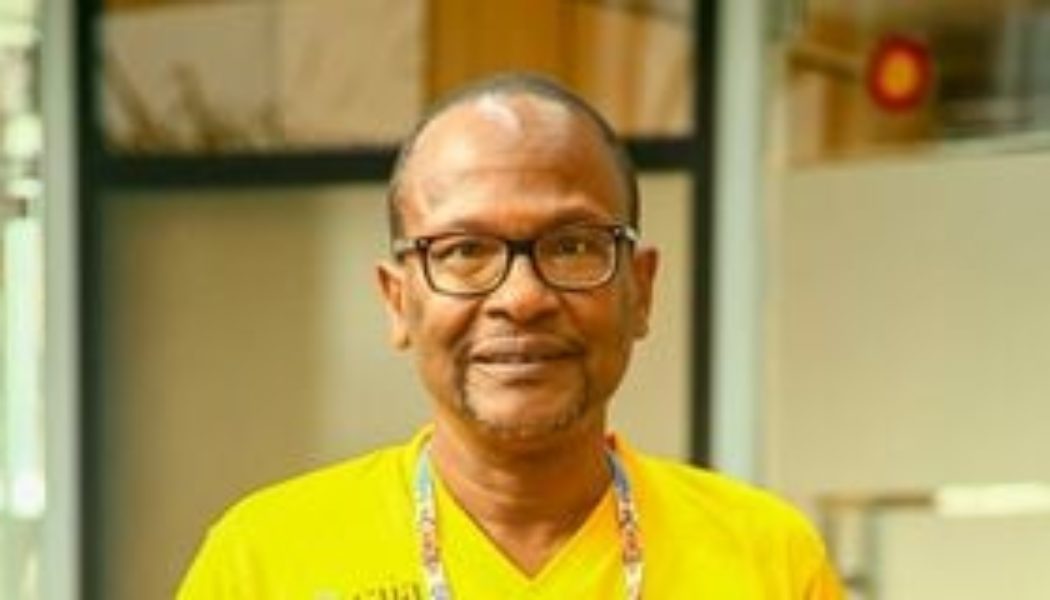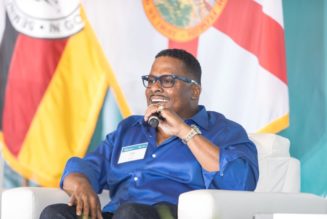Did you know that there are only two parts of the body that cannot get cancer? That’s right. Hair and nails. That’s how David Makumi, the CEO of Faraja Cancer Trust, greets me.
David knows a lot about cancer. His life revolves around it, and you can see it in the way simple details act as cracks through which emotion leaks out, first as a trickle, then, all at once, as a flood. It takes a certain kind of man to do certain things.
He is no different from an inmate on death row, though the circumstances may be different, the results are eerily similar. Sometimes you win, sometimes you don’t. Sometimes you survive, sometimes you don’t. But David’s faith is unshaken, convinced that the Faraja Trust is the rock on which he can build the foundation, if not the cure, to fight cancer.
He reminds me of the story of Mother Teresa. Mother Teresa was living in Calcutta, India with some orphans and was running out of food when she saw a wealthy merchant.
She approached him and asked, “Please help us with something to eat.” The man smiled and barked, “Here, take this!” and then spat on her open palm. Mother Teresa wiped her hands on her sari and said, “Thank you. This is for me. Now give me something for the hungry children.” The man was moved to tears.
Similarly, David’s hands are outstretched. To receive so that he can give. This is a calling. And he has been answering the phone ever since.
How did you get into this?
I have had an illustrious career in the cancer space for almost 20 years. I have worked with cancer advocacy groups; I was the founding chairperson of the Kenya Network of Cancer Organisations a decade ago.
I have been in the cancer space at different levels, both clinical [chemotherapy] and administrative and policy levels with boards of trustees.
Unlike other CEOs who worry about their bottom line and the happiness of their shareholders, for me it is about making sure my team can deal with the mental challenges of handling patients. Because cancer happens all day, every day, people stop me in the supermarket and ask me, “How can you help?
How does that change the way you live your life?
It makes you wake up with a deep sense of gratitude — that you are healthy. You want to make a difference, and you want to do something about it because you are healthy.
Death is a continuum of life, sometimes we lose patients and sometimes we see patients suffering for lack of small amounts of money. It is estimated that by 2028, Kenya will have 59,000 new cases annually.
What do you fear for yourself?
That I will die before we can streamline cancer services so that people are no longer forced to dispose of their investments.
Cancer impoverishes people and kills 100 patients every day. If we don’t have streamlined services, it will feel like I’m dying with unfinished business — it’s a song we’ve been singing for 18 years. I don’t want to sound like a broken radio.
This stuff is heavy. How do you calm your mind?
By walking in the forest — especially Karura and Kereita. The trees are just there, waiting. They sit majestically in nature. But we also have debriefing and therapy sessions at work. It is a catharsis — emptying yourself.
What do you think about when you walk?
The Almighty and I. Sometimes I walk in the Resurrection Garden in Karen. I find myself in a state of gratitude — grateful for everyone around me and for making a difference.
I also ask God for wisdom, the wisdom to know how to talk to people who have just been diagnosed with cancer.
How long are your walks?
Five to 10 kilometres. My wife and I enjoy these brisk walks, almost like a jog. They are good for the heart and help prevent major non-communicable diseases that share the same risk factors.

David Makumi, Chief Executive Officer of Faraja Cancer Support Trust, poses for a photo during an interview at Parklands, Nairobi on July 25, 2024.
Photo credit: File| Wilfred Nyangaresi| Nation Media Group
How does your wife handle David in this cancer space?
She’s very supportive. Sometimes it gets to her because we could be having a nice dinner at a Chinese restaurant — candles and the whole shebang — and someone comes over and asks us about cancer.
You know those “just a quick question about cancer”. Often it cannot wait. When she was doing her Master’s thesis, she chose a cancer topic: “Distress among people who had colon cancer and were using a colostomy [external bag for waste]”. After that she was probably traumatised and never came back, haha!
What was your aha! moment with your wife? Why do you keep choosing her?
Is this the part where I blush? Haha! I love that we can go to the market holding hands. She can hear the song in my heart and sing it when my memory is cloudy.
She just gets me. She makes the stew, and I make the ugali. I make the best ugali in Kiambu County. I swear!
How has your interpretation of the word “husband” changed over the years?
We lose about 60 per cent of our patients to cancer and that has made us value each other even more. We create our moments. We love to travel — she loves road trips; I just want to get there. We support each other on our journey.
What’s your favourite thing about you?
I value people. From the gateman to the top executives–everyone. I can relate to people from all walks of life.
What is a misconception people have about you?
People think I know everything about cancer. Sometimes I’m clueless [laughs] or I’m having a bad day, and I don’t know. They think I know how to hack it.
Someone rang me a few days ago and asked me to do a one-liner for their event. I thought “one-liners don’t work like that”.
What is the one thing about you that I wouldn’t believe?
These are very philosophical questions. However, I do enjoy country music very much. “The older I get… the fewer friends I realise you need”. It’s a song by someone, I can’t remember who. I also love the classics, especially Beethoven.
What is the soundtrack to your life now?
Haha! It has to be “Amenitendea”.
What is life’s simplest pleasure?
Wearing new shoes that don’t hurt. When I was a child, that was really important because when your parents bought you a new pair of shoes, you didn’t want to let them go, even if they hurt, because your younger siblings would inherit them.
At the moment, a good night’s sleep and a well-cooked meal do it for me.
What’s your go-to meal?
Chicken stew with chapo and/or ugali with pilipili. That’s magic. But between you and me, I think what will feed us in heaven will be chapo mandondo and avocado. It is a divine meal.
You are a husband, a father, a church elder… who are you to you?
I am my best friend.
How do you show yourself love?
A good night’s sleep. I wake up early to do a few things to my flowers. That is how I treat myself.
What do you have that others don’t?
Enough reservoir of compassion. I could do this for another 100 years. What keeps me going are the positive stories, when someone tells me that the patient we helped is back on their feet.
A woman called me recently to say that her son, whom we had looked after during his chemotherapy treatment, is now cancer-free. And he finished school. “Sasa mtafutie kazi.” Ha ha!
When all is said and done, when you get to where you are going, where will you be?
Sitting in a rocking chair by the fireplace, country gospel rocking, a good book on my lap, rereading Robin Sharma’s wisdom from The Monk Who Sold His Ferrari.
On this rocking chair, if you could know the truth about one question, what would you ask?
Why do-little children get cancer? They don’t smoke, they don’t drink, some aren’t even genetically predisposed to cancer, so why do they get it?
What is a question you keep asking yourself?
Why do certain things happen the way they do, and why are we as a country not as concerned about human suffering as we should be?
The world’s major religions talk about compassion for the poor and love for our neighbours, so why don’t we fix the world where we are? Some things should not even be prayer requests, we can come together to help.
What are you asking God for right now?
Good health.
What do you need less of in your life?
Drama [laughs].

David Makumi, Chief Executive Officer Faraja Cancer Support Trust, during an interview at Parklands, Nairobi on July 25, 2024.
Photo credit: File| Wilfred Nyangesi| Nation Media Group
What is something you have believed to be true for a long time, but in the course of time have realised that it isn’t?
Hmmm. That you can trust everyone, or that everyone means well. They don’t.
If you could only tell me one thing, what would it be?
My thinking involves opportunities. What can we do together against cancer?
Who do you know that I should know?
Lazarus Njenga. He is the most generous man I have ever seen — he has health challenges, including sight, but do you know that some people go to his house to collect unga? He doesn’t make a fuss about it, but you will hear it. He is the most generous soul.









